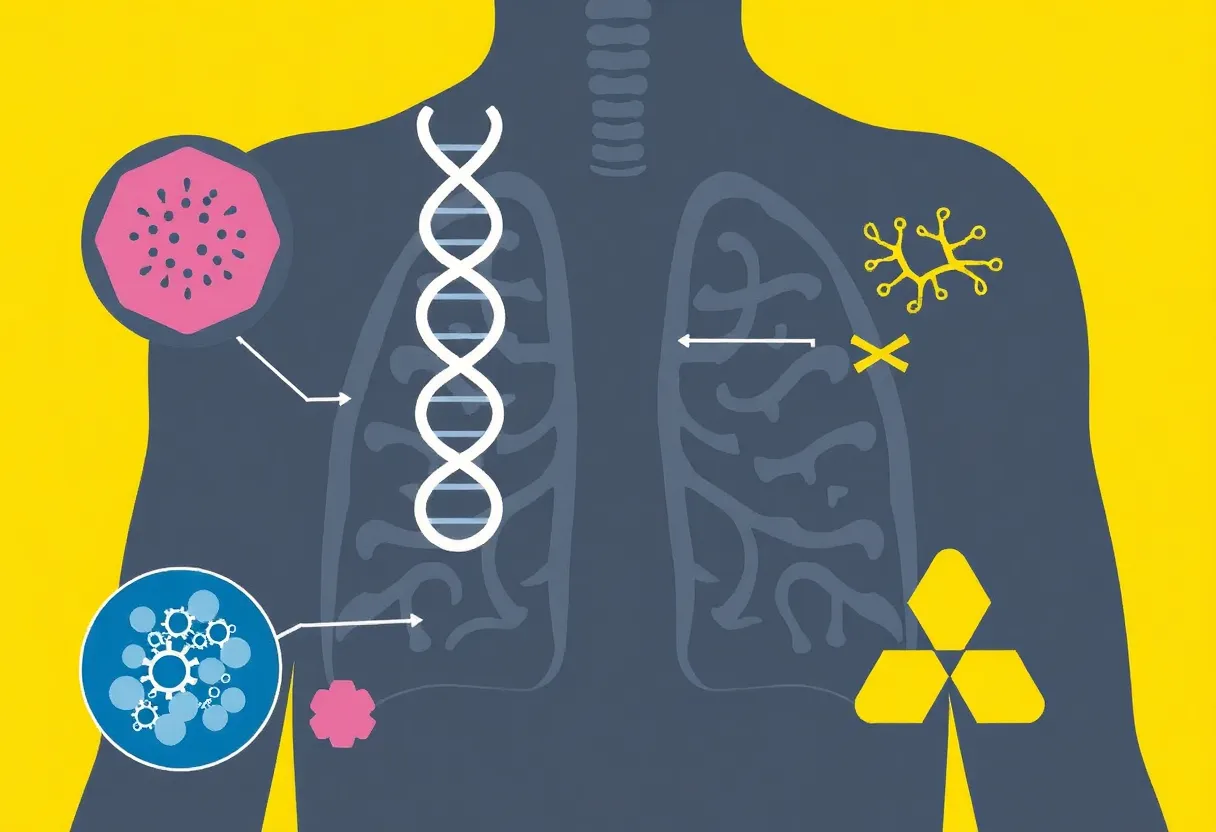News Summary
A new study reveals genetic changes induced by asbestos exposure leading to Malignant Pleural Mesothelioma, highlighting critical pathways and potential biomarkers.
Unlocking the Mystery of Malignant Pleural Mesothelioma Linked to Asbestos Exposure
In a groundbreaking study, researchers have unveiled significant insights into the genetic changes caused by asbestos exposure that lead to Malignant Pleural Mesothelioma (MPM), a rare and aggressive cancer. The research, carried out by scientists from the Sbarro Health Research Organization (SHRO) in collaboration with the University of Siena, provides a comprehensive look at the molecular mechanisms driving this devastating disease.
Investigating the Genetic Landscape
Utilizing advanced bioinformatics tools, the team employed public RNA sequencing (RNA-seq) data to analyze the genetic framework associated with MPM. The study has identified both known and novel genes and pathways that may be involved in asbestos-induced carcinogenesis. The findings were published in the journal *Experimental and Molecular Pathology*, emphasizing a collaborative effort that saw experts from various fields join forces for a common cause.
Funded by the Italian National Institute for Insurance against Accidents at Work through the BRiC-INAIL 2022 program, this research promises to illuminate the complex relationship between asbestos exposure and genetic alterations in affected patients. As asbestos exposure has a prolonged latency period, the rising global incidence of mesothelioma underlines the need for innovative and effective management strategies.
Identifying Key Biological Processes
Through meticulous RNA-seq analysis, the researchers pinpointed a distinct set of differentially expressed genes (DEGs) related to asbestos exposure. They identified crucial biological processes that include ion homeostasis, oxidative stress response, and cellular disorganization. These processes serve as tell-tale signs of the cellular damage triggered by asbestos, offering a window into the pathogenesis of this lethal cancer.
The implications of these findings are enormous. The researchers aim to create a molecular roadmap to better understand how asbestos exposure contributes to cancer development, with the ultimate goal of elucidating reliable diagnostic and prognostic biomarkers for MPM. This advancement holds the potential to significantly impact precision medicine by facilitating personalized treatment strategies tailored to the specific molecular profiles of patients.
Bridging the Gap to Patient Care
As the scientific community increasingly emphasizes the importance of identifying patients at higher risk for developing MPM, this research can potentially pave the way for novel therapeutic targets. The team, which includes several co-authors with diverse expertise, has noted a growing need for integrated approaches that combine genomics and immunology to tackle the complexities surrounding MPM.
The findings underscore the significant role that genomic instability plays in the clinical management of MPM, and the ongoing examination of how molecular profiles correlate with treatment responses among patients reveals a pressing need for improved diagnostic tools. With MPM being notoriously resistant to conventional treatment options, the development of new therapeutic strategies has become paramount in improving patient outcomes.
A Collaborative Effort for a Cause
This research serves as a testament to the importance of collaboration among institutions, showcasing that tackling complex diseases like MPM requires a multi-disciplinary approach. By combining the expertise of geneticists, pathologists, and oncologists, researchers are forging ahead in the battle against this devastating cancer.
The complete findings are documented in the article titled “From Asbestos Exposure to Carcinogenesis: Transcriptomic Signatures in Malignant Pleural Mesothelioma,” set to be published in *Experimental and Molecular Pathology* in 2025. The research stands as a potential catalyst for further exploration into cellular alterations in MPM, while also raising awareness about the significance of understanding the genetic landscape of this insidious disease.
Deeper Dive: News & Info About This Topic
HERE Resources
Intense Battles Rage in Chasiv Yar: The Strategic Fight for Donetsk Oblast
Western MacArthur’s Asbestos Legacy: A Hidden Crisis Unveiled
Recent Legal Victory for Mesothelioma Victim Against Asbestos Company
The Asbestos Trial’s Dramatic Unfolding Continues in Bloemfontein
Unveiling the Hidden Dangers: The USS Rich’s Asbestos Legacy
Roadworks Delayed Due to Asbestos Discovery: Residents React
Asbestos-Laden Fly-Tipping Incident Shocks Warwickshire Community
Salem, WV Prepares for Major Asbestos Demolition Project
Scott County Board of Education Takes Major Steps for School Improvements
The USS Shelton: A Legacy of Valor and Asbestos Peril



















